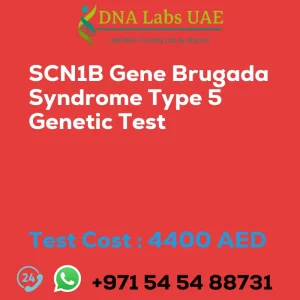KCNQ1 Gene Atrial Fibrillation Type 3 Genetic Test
Components
Price: 3200.0 AED
Sample Condition: Blood or Extracted DNA or One drop Blood on FTA Card
Report Delivery: 3 to 4 Weeks
Method: NGS Technology
Test Type: Cardiovascular Pneumology Disorders
Doctor: Cardiologist
Test Department: Genetics
Pre Test Information
Clinical History of Patient who is going for KCNQ1 Gene Atrial fibrillation type 3 NGS Genetic DNA Test. A Genetic Counselling session to draw a pedigree chart of family members affected with KCNQ1 Gene Atrial fibrillation type 3 NGS Genetic DNA Test gene KCNQ1.
Test Details
The KCNQ1 gene is associated with a condition called atrial fibrillation type 3. Atrial fibrillation is a heart rhythm disorder characterized by irregular and rapid heartbeats in the upper chambers of the heart (atria). Type 3 atrial fibrillation specifically refers to cases caused by mutations in the KCNQ1 gene.
NGS (Next-Generation Sequencing) genetic testing is a method used to analyze multiple genes simultaneously. In the context of atrial fibrillation type 3, NGS genetic testing can be performed to identify mutations or variations in the KCNQ1 gene that may be responsible for the condition. The test involves obtaining a DNA sample, usually through a blood or saliva sample, and analyzing it using advanced sequencing technology. The genetic information obtained from the sample is then compared to a reference genome to identify any variations or mutations in the KCNQ1 gene.
NGS genetic testing for atrial fibrillation type 3 can help with diagnosis, risk assessment, and genetic counseling. It can also be useful for family members who may be at risk of developing the condition. Treatment decisions and management strategies can be tailored based on the genetic information obtained from the test.
It’s important to note that genetic testing for atrial fibrillation type 3 should be performed by a qualified healthcare professional or a genetic counselor who can interpret the results and provide appropriate guidance and support.
| Test Name | KCNQ1 Gene Atrial fibrillation type 3 Genetic Test |
|---|---|
| Components | |
| Price | 3200.0 AED |
| Sample Condition | Blood or Extracted DNA or One drop Blood on FTA Card |
| Report Delivery | 3 to 4 Weeks |
| Method | NGS Technology |
| Test type | Cardiovascular Pneumology Disorders |
| Doctor | Cardiologist |
| Test Department: | Genetics |
| Pre Test Information | Clinical History of Patient who is going for KCNQ1 Gene Atrial fibrillation type 3 NGS Genetic DNA Test. A Genetic Counselling session to draw a pedigree chart of family members affected with KCNQ1 Gene Atrial fibrillation type 3 NGS Genetic DNA Test gene KCNQ1 |
| Test Details |
The KCNQ1 gene is associated with a condition called atrial fibrillation type 3. Atrial fibrillation is a heart rhythm disorder characterized by irregular and rapid heartbeats in the upper chambers of the heart (atria). Type 3 atrial fibrillation specifically refers to cases caused by mutations in the KCNQ1 gene. NGS (Next-Generation Sequencing) genetic testing is a method used to analyze multiple genes simultaneously. In the context of atrial fibrillation type 3, NGS genetic testing can be performed to identify mutations or variations in the KCNQ1 gene that may be responsible for the condition. The test involves obtaining a DNA sample, usually through a blood or saliva sample, and analyzing it using advanced sequencing technology. The genetic information obtained from the sample is then compared to a reference genome to identify any variations or mutations in the KCNQ1 gene. NGS genetic testing for atrial fibrillation type 3 can help with diagnosis, risk assessment, and genetic counseling. It can also be useful for family members who may be at risk of developing the condition. Treatment decisions and management strategies can be tailored based on the genetic information obtained from the test. It’s important to note that genetic testing for atrial fibrillation type 3 should be performed by a qualified healthcare professional or a genetic counselor who can interpret the results and provide appropriate guidance and support. |








